
Passionate Abolitionist and
Witness to the American Civil War


Passionate Abolitionist and
Witness to the American Civil War

TJ Is still driven by his abhorrence of slavery and this important letter includes more personal testimonials about the realities of slavery than any other document in this collection. It turns out that he met in person with several ex-slaves from Louisiana and left us with his first hand accounts of the backgrounds and personalities of those he met. He also included in his letter of 18th April 1864 two cartes de visite (small photos in a visiting card size format that had become very popular at the time.) These small documents have now provided us with fascinating links to an area of civil war history that we only became aware of as recently as 2023. We elaborate some of our recent discoveries in the AMBASSADORS’ NOTES at the end of this letter.
I have had a long conversation with this man.
He is a very honest simple hearted, good man. More intelligent than laborers usually are. He was a methodist preacher among his fellow slaves. And because he spoke of their wrongs, his owner branded him on the forehead and made him wear the pronged iron collar and leg shakles, night and day for a whole year & put an iron gag in his mouth when he was not at work. This I know to be true..
-Thomas Jackson
Taken at Baton Rouge,La, April 2nd, 1863
Camp Parapet, La
August 4th 1863,
Colonel.
I have found a large number the four hundred contrabands examined by me to be as badly lacerated as the specimen represented in the enclosed photograph.
Very respectfully
Yours
JW. Mercer
Asst. Surgeon, 47th M.V.
Thomas Jackson wrote about slavery many times in this collection of his letters. However, in this particular letter, he took the time to be an oral historian by interviewing several ex-slaves he knew.
“The treatment of the slaves in our southern states has been cruel in the extreme. This war is fully exposing the wrongs & horrors of the house of bondage”
“The slave holders wives always use the white slaves much worse than they do the black ones, because they always know, or think, that master is the Father of them.”
Here is part of one poor woman’s oral history taken down by TJ.
“My husband ran away to reach the Union army before christmas 1862. He was in the woods & mountains nearly two months altogether. After he had found the Union camps he came back for me. Then we started both together and after being out in the winter, hiding by day and walking at night a long time & bearing much hardships, cold & hunger & often in danger of being taken, we reached the Union Army at Winchester.”
TJ speaks of how he wants to treat the southern rebels:
“We will meet you as friends & brothers and dwell together in peace & good fellowship doing all we can for the advancement and prosperity and honor of our common country. But do not bring your bondmen with you.”
“We in common with nearly all christiandom, consider slavery to be a curse and a great outrage upon all the rights of man, which we hold so dear for ourselves.”
In addition to his focus on slavery, TJ gives and extensive account of the bustling cities of New York and Philadelphia. Also growth of coal business that TJ was involved in.
He explains that wages and need for communities to pay bounties to get men to sign up for war “So many men have gone to the war & so many more are now enlisting, that workmen & laborers are very scarce. The high bounties are the main inducement.
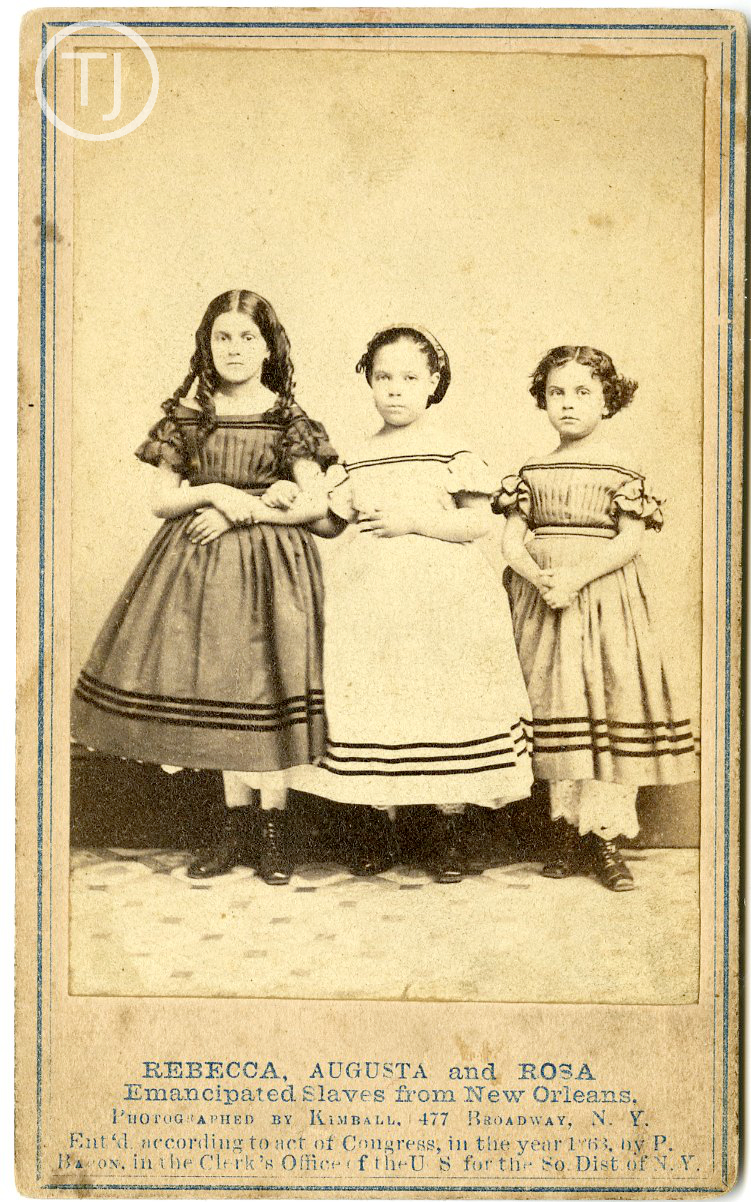
Rebecca, Augusta and Rosa 1863
Thomas Jackson describes his impressions having met these 3 emancipated slaves from New Orleans.
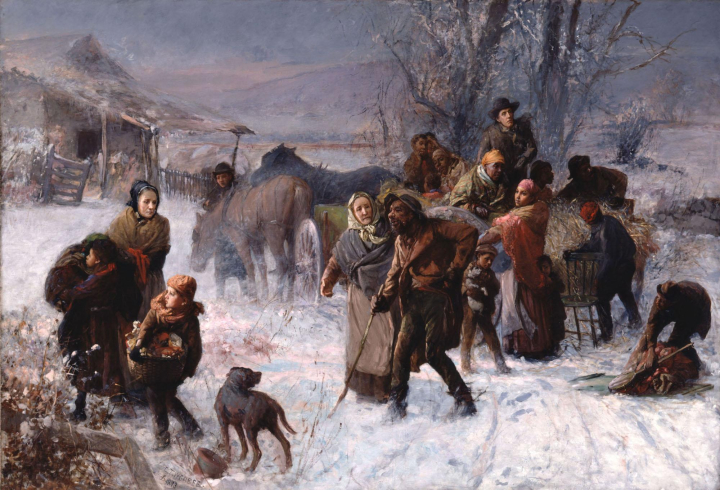
The Underground Railway: African Americans escaping from slavery
One of Thomas Jackson’s sources described contrabands depending on other slaves to feed them and hide them as they fled to escape from slavery. In addition to this, there was a well established underground railroad that would help slaves flee north even into Canada. These abolitionists were of all backgrounds; white as well as black, men and women and many religions especially Quakers and methodists.
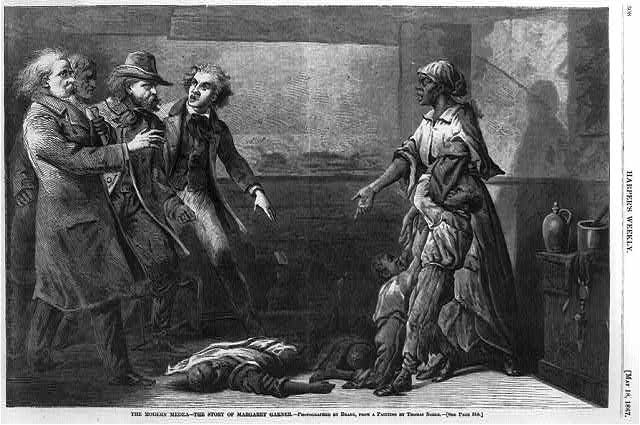
Margaret Garner- the desperation of a slave mother
A slave who killed two of her children so they would not have to endure slavery. She had escaped from Kentucky to Ohio and is seen now lying dead on the floor and found by the four men had been pursuing her. From painting by Thomas Satterwhite Noble.
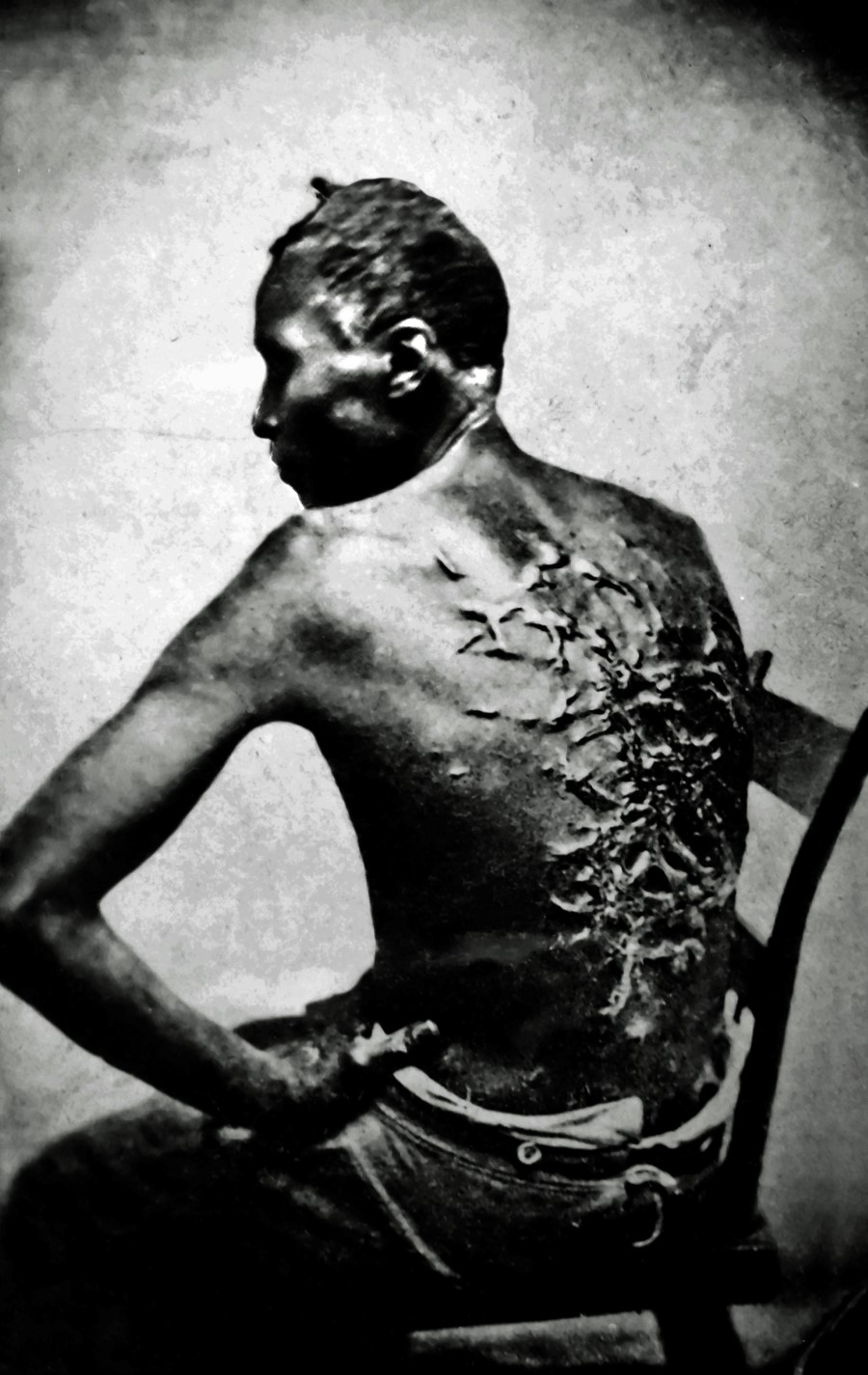
Scars of a whipped Mississippi slave
Original photo taken April 2 1863 “Overseer Artayou Carrier whipped me, I was two months in bed sore from the whipping. My master come after I was whipped: He discharged the overseer. said by poor Peter as he sat for this picture.
Any thought that such viciousness was a very uncommon experience is challenged by reading the testimony written on the back of one of the cards displaying these cruel wounds.
Sources
1,2 and 3. Thomas Jackson Collection
4. Library of Congress http://loc.gov/pictures/item/985103870/
Reproduction of painting by Charles Webber. 1891
5. Library of Congress:://www.loc.gov/pictures/item/99614263 http
6 and 7 Library of Congress. https://www.loc.gov/item/2018648117/
ENVELOPE.
[Envelope is preprinted Lincoln campaign envelope, with image of Lincoln; a badge containing the names of Abraham Lincoln for President and Hannibal Hamlin for Vice-President, surrounded by flags and surmounted by an eagle; and an image of a boy splitting a log near a log cabin and rail fence, with the motto: “Constitution and the Union – – Harmony and Prosperity to all.” Envelope is addressed to:]
Caleb Slater Rope Maker
Eastwood near Nottingham
Notts, England Europe
LETTER.
Reading Penna March April 18. 1864
Dear Cousin
I should have written to you again before now, but we have been so very busy during the last 8 months that I really have not had time. I am very much engaged all day & when I come home in the evening, get supper & look over my daily newspapers I am too sleepy then to attend to any thing. During all the 34 years I have been in America I never knew such busy times as we have now.
I have been to New York and Philadelphia several times during the last year. Passenger trains full of People, long trains of freight cars all heavily loaded seemed to be quickly following each other on all the rail roads I passed over. In the cities, hotels crowded with guests, rail way stations with travelers, and freight stations with goods & merchandise of all descriptions. At some of the goods stations draymen have to wait over half a day for their turn to get a load in. Before the war the usual charge for carting hemp from the merchants warehouses to the rail way stations was 8 a 10. cents per bale, according to distance. I have lately had to pay 50 cents per bale cartage. and I taking the best opportunity on those days when there is the least crowding, can never get it carted under 25 cents a bale of 270 lb. each.
The increase of business on the Rail Road passing through Reading has been most extraordinary last year. The rail road is 96 miles long running from Philadelphia to Pottsville in the anthracite coal region of Penna, and has a double track & a down grade up to Philadelphia the whole distance. The quantity of coal carried on that rail road in 1862 was 2,058,887 tons and in 1863 it was 3,065,261 tons. an increase of one million six thousand three hundred & seventy four tons. very near one half more. The quantity of coal consumed in Reading in 1862 was 138549 tons. Last year, 1863 it was 176214 tons. an increase of full 27 per cent.
I have sent you a copy of the Miners Journal. of Pottsville which has a very full statement of the coal trade of Penna ever since 1820. From it you will see that the quantity of coal taken down the schuyl schuylkill canal (then the only means of transport down the schuylkill valley) in 1829. The year I settled at Reading, was 79.973 tons. Last year the quantity taken down this valley by Canal 885,542 tons, by rail road 3,065,261 tons. Together 3,950,803. From this you may know how much I have seen the business of this region increase during the 34½ years I have been interested in it. The increase in the consumption of coal gives some idea of the increase in population, manufactures & business of all kinds.
When I first settled here there was not a steam engine in Berks county. Now there are 46 stationary steam engines in Reading alone, and many more in the county. Two more manufactories & a new rolling mill are being built here now, and a large number of New houses. Wages are very high. I am paying my hand spinners six shillings (English) a day. The boys that tend the spinning machines, equal to two shillings english money a day. and the wheel boys from seven to eight shillings a week. But the colliers in the coal mines above here are getting now from one to two pounds a day (English money) and hard to manage with even at that. They work
page 2
when they like, play when they please, and have things pretty much their own way generally. So many men have gone to the war & so many more are now enlisting, that workmen & laborers are very scarce. The high bounties are the main inducement. The United states bounty is 402 dollars. and the state, city & ward bounties in Reading are 300 dollars more. In some of the Eastern states they are 725 dollars more. Making altogether 1127 dollars bounty. This, even in our depreciated greenback paper money, is over £166 pounds sterling in gold. They get food clothing & 13 dollars a month pay now, & are entitled to 160 acres of of good land when the war is over. By that time all the confiscated lands of the rebels will be in possession of the United states government & a soldier who survives the war may slice his land out of a sugar or cotton plantation & hire the freed blacks for his farm hands.
I hope the poor negroes will then get kinder employers than their late masters have been. The treatment of the slaves in our southern states has been cruel in the extreme. This war is fully exposing the wrongs & horrors of the house of bondage, and working a wonderful change in public opinion among the reading & reflecting portion of the Northern people. They see now that the develish system of American slavery had become so infamously bad that it deserved the just vengence of the almighty, and that this vast war is a well deserved punishment visited upon a whole people for crimes but little less than called down fire from high heaven upon Sodom & Gomorrah.
I inclose you some photographs of white slaves that have escaped to liberty & come North. I have seen and spoken to them all. The children are from New Orleans. Have been under the care of Northern teachers who went to New Orleans & established schools for the “contrabands” soon after our Union forces took the city. They are very bright beautiful and intellegant children & so white that no one would ever suspect that they had a drop of African blood in their veins. Two of the little girls are exceedingly beautiful & interesting children when spoken with & their innocent hilarity encouraged.
Mary Longhurst whose likeness I send you is a young married woman. Her husband was a slave also & escaped about the same time she did. She is a white woman for all any one can see in her appearence & would pass for a white woman any where. Her mother must be white also. I had this “contrabands” story from her own lips & wrote it down. It is too long to send you entire, but I will give you an extract.
“My name was Mary Kimbler. I was born the slave of Roland Kimbler of Madison county Virginia. He is my Father. My mother was then & now is the white slave of Roland Kimbler. I am now about 23 years old. My Father & owner was about 60 years old when I left him. He is the Father of more slaves beside me. Some by nearly black mothers are pretty dark complexioned. I was always treated as a slave. Was put to all kinds of hard work in the house and in the field, and not allowed to make the least attempt at education.
The slave holders wives always use the white slaves much worse than they do the black ones, because they always know, or think, that master is the Father of them. I was married about two years ago to Abraham Longhurst the slave
page 3
of Thomas Fletcher living about a mile from my Father. My husband is about half black. In the fall of 1862, when there was a talk of the Union army coming into Madison county, our owners took all our clothing from us, shoes and every thing but what we had on, & locked them up for fear we should run away to the Union camps.
My husband ran away to reach the Union army before christmas 1862. He was in the woods & mountains nearly two months altogether. After he had found the Union camps he came back for me. Then we started both together and after being out in the winter, hiding by day and walking at night a long time & bearing much hardships, cold & hunger & often in danger of being taken, we reached the Union Army at Winchester. about the last of February 1863. But we could never have got there if the other slaves had not fed and hid us as we came along. all the colored folks help one another to get off to the Union men.”
This woman & her husband live in Reading now, but none of the white americans here will associate with her because she has been a slave, & her husband is not a purely white man, although he is a honest, sober, hard working industrious & religious man & a kind husband.
I have three colored men at work for me now. Two of them nearly full blooded negroes. One of them was owned by a man in virginia who had a machine shop and iron foundry. Owned over 30 menslaves & had nearly all his work done by them, according to the great Southern doctrine; which is the sole cause and foundation of the rebellion; “That it is far better for capital to own labor than to hire it”. That is the great & only thing that the south is now fighting for. But more of this presently.
My “contraband” engineer is a real smart fellow & can handle our steam engine, go to the anvil, the vice, or the lathe & do a job of repairing as well as any man I ever had about it. He has a wife and 4 children with him here. They all escaped together. He tells me that when the Union army was coming towards his masters place he told his slaves that the Northern soldiers would kill them all & chop off their heads, arms, and legs & do awefull things, and then he ran away & left his slaves and all he had behind him. Many of the slaves were afraid & hid away “like partridges” (his own words). But the Union men came & hurt nobody, and then the slaves all came out & went off together to the Union army & his master lost nearly every thing he had slaves and all.
when I pay these poor fellows there full wages every week, it would do any true Englishman’s heart good to see their happy faces, dark as they are, showing such full & pleasing satisfaction, such warm gratitude for the kind treatment and just payment for their labour. They will hold their money out in their hand, look at it and laugh most joyfully. One will say “Oh! I never spected to see this. I never thought I’d be free to get my own pay for myself. Master used to hire me out by the year to the farmers for $. 150 dollars a year, my keep, two suits of coarse clothes and one pair of shoes a year. One year he got. 175 dollars, but, de lord bless you sir, I never seed any ov it, cept a dollar he guve me at christmas. never more an that dollar a whole year, and hard work, hard blows & kicks into de bargain.
page 4
Day use us bad down dar sir. If day ever find faut with any on us sir, de blow allis cum first sir, and de words arter, and den we have to jump around sir I tell he”. –
The black engineer is a stiller & much quieter man. Evidently a deep thinker & close observer. Quiet & still as he is, Nothing going on near him escapes his attention. When he first came into our walk he watched every thing going on with such a quiet earnestness, that it seemed a natural instinct in him to want to understand every thing quietly for himself, & in his own way, without asking questions of any body. And after a while he would lend a hand or do a job at almost any thing as if he had been long used to it. When he gets his wages and hears the laughing remarks of the other, he will say with a quiet Smile. “Well thank God I used allis to think I’d be free sometime. I used to feel as if I’d sure to get my wages for myself then, and I know’d that my chillen ‘ud be free too then. Thank de lord it come at last and I’m not a old man yet either”. He is about 45 years old, as near as he can tell, and a very strong, bony & hardy man.
They may call him nigger because he is black & has a wooly head. But there is intellect in it & of a high order too. If when he was a boy he had been properly educated & then allowed to choose the occupation he had the most likeing for, he would have been has good a workman at any trade he took hold of as ever entered a shop. But all the slave states have laws severely punishing any attempt to educate a colored person, male or female. and they were always rigidly enforced.
Only a few years ago a northern young woman went to Virginia as private teacher in a planters family to educate his legitimate white children. Not knowing the law & her danger she got at teaching some of the young slaves privately. After awhile she was found out at it, prosecuted under the virginia laws, convicted and sentenced to ten years solitary confinement in prisonment at hard labour. She was a very well educated and most respectable girl of good family. The sentence was considered here far too severe even under their most infamous laws & there was considerable stir made about her in the free states. After a great deal of trouble & the exertion of every possible means & influence that could possibly be brought to bear in her favor, Governor Wise of Virginia pardoned her on condition that she returned to the north & never entered a slave state again.
Some 20 years ago this same Wise was a member of congress for Acomac county Virginia, and boldly boasted, in his seat in the house of representatvies at Washington, that his district had neither a schoolhouse nor a newspaper in it & he thanked god that it was so, and hoped it might never be otherwise. A very pretty wise he is. He is now ‘General’ wise, One of the leaders of this infernal rebellion If he lives to see the end of it, and escapes a halter, he will have lost every
page 5
thing he has in the world, slaves & all. And richly will he deserve it. I could fill quires of Paper with the tales of the horrible cruelties & inhuman outrages committed by the rebel slavemongers.
One of my colored “contraband” workmen tells a pittiful storey of the wrongs done him when he was a slave. Among them he says, That about 16 years ago, when he as a young man, his owner permitted him to marry a slave girl belonging to a neighbor. They were regularly married by a baptist minister “exactly same as white folks” says he. His owner allowed him to see his wife one night a week. But about two years after his marriage, this neighbor sold his wife and their child to a slave trader, and the poor woman & her little one were sent to New Orleans after a most painful parting with her husband. The poor fellow could never be induced to marry again, minister or no minister.
He has been a truly pious member of the baptist church over 18 years & says he knows the lord will bring him & his wife together again and he is now doing all he can to get a home ready for her. He has only heard from her once since they were parted. But he says she is some where above New Orleans & he knows that General Banks’s union army will give her a chance to get off & she will. He has been a teamster in the Union service for two years & got lamed for life by the kick of a horse, otherwise he says he should surely have been with the union army now in the far South looking out for his wife & daughter. Poor fellow I hope his great & firm faith may be fully rewarded. There are many thousands of similar cases.
I know one villianous Englishman now in Georgia working for the rebels, who bought two fine looking young slaves. A man & his wife who had not been long married. A slave dealer came along & offered him 1500 dollars for the young wife, and the cruel scoundrel sold her away from her husband in spite of all the poor fellows supplications to be sold along with her & on his knees imploring him for Godsake not to part them. But the cold hearted scoundrel was deaf to all entreaty & dead to all the finer feelings of humanity which we suppose would influence any one, not quite a fiend, and the poor woman was dragged in chains away from her husband for ever for no crime but being “guilty of a skin not colored like our own” or a lineage not so purely white as her anglo american owner.
And it was with the develish determination to extend their infernal system of human slavery over vast regions yet free from the curse, that these southern aristocrats rebelled against a government they had entirely controlled ever since the hour of its establishment, and could even then controll, for they & their northern proslavery allies had a majority in both houses of congress & on the bench of the supreme court,
If they had remained quiet slavery would never have been interfered with in the fifteen states it was established in unless the people of those states, themselves chose to abolish it by due process of laws passed by their own state legislators. But by the election of Abm Lincoln the free states said to them “The united states of america have 31 millions of inhabitants. You and your slaves number but 12 millions. You now occupy the finest, and most productive portion of our common country, comprising an area of eight hundred and fifty one thousand five hundred square miles (over 7 times as large as Great Britian and Irland) You have ample room and verge enough for your “peculiar institution” where your sway is entirely undisputed, but we do not wish human bondage exteded on this continent any further. within your own states manage your own domestic affairs and institutions to suit your selves. Pass whatever state laws
page 6
you like providing they are not contrary to the constitution of the united states under which we have lived so long & prospered so much. We freely & most willingly admit your full title to all the rights, liberties, freedom, franchises & priviliges under that constitution which we claim for ourselves, and, if needs be, we will defend you in the full enjoyment of all we hope to enjoy. We ask nothing that we are not quite willing you shall be heartily welcome to share equally with us. If any or all of you choose to emigrate & settle in the vast territories of the united states you are on exactly the same terms & conditions we ask for ourselves, go there & Gods blessing be with you. We will meet you as friends & brothers and dwell together in peace & good fellowship doing all we can for the advancement and prosperity and honor of our common country. But do not bring your bondmen with you.
We in common with nearly all christiandom, consider slavery to be a curse and a great outrage upon all the rights of man, which we hold so dear for ourselves; we know that you have not prospered half so well with it as you would have done without it. We know that it is the deadly foe of freedom, & we wish the great west to be the land of liberty, the home of the free for ever & its rich soils never to be tilled by the hand or trodden by the foot of a slave”.
Such was our language to the slave holders. Such were our offers made in all kindness & good faith. But the houghty man stealer spurned us with the greatest insolence and contempt & proclaimed that the only true & proper relation between capital and labour was that capital should own labour & not hire it. That all masters should own workmen and workwomen, black or white, and their families also, and feed and care for them as they do for horses & mules. And they claimed the right to take their slaves every where, as we do horses & mules, and they demanded that we admit that damnable principle as holy just and proper, or they would force it upon us untill (as Toombs of Georgia said) they could call the roll of their slaves in the shadow of Bunker Hill monument. We remonsterated & they fired on our flag. We refused their demands & they bombarded the United states fort sumter, and commenced a war for slavery carrying it on ever since it began according to the slave holders creed of cruelty & blood.
They made it a rule to butcher all our black servants & teamsters they could take before we freed a slave or armed a negro. Since we proclaimed freedom to their slaves they kill or reenslave all our colored soldiers they can take, & hang their white officers. We have undoubted evidence of their surprizing and taking a whole company of colored soldiers & slaughtering the whole of them after they had surrendered.
The rebel president Davis has declared by public proclamantion that all colored men taken in arms against them will be put to death, & their officers threaten to hang ten of our white men for every one we hang of theirs if we retaliate. These are the fiends that are fighting for “independence”. These are the men whom your “Southern aid societies” are assisting in the perpetration of the most enormous villany ever attempted since the creation. The reduction of this vast continent to slavery and a vassalage worse than any existing anywhere else in the world. It could have been about as respectable and honest to have formed Algerine aid societies in England, when the Barbary pirates were killing and enslaving all the christians they could catch. My Lord Wharnclif, Mr Roebuck and the
(End of page 6. Further pages missing)

The particular picture card of Wilson Chinn surrounded by instruments of torture that was found in this Collection is especially valuable because Thomas Jackson had written what he learned of the ex-slave’s background on the reverse of the card. Because this photograph had become so famous during, as well as after the civil war, we were challenged to guess how TJ had ever come to meet with him in person.
We finally came to consider the outrageous possibility that Wilson Chinn was indeed so well known that he might be respectfully toured as an attraction for Northerners to meet with him in return for money donated to benefit ex-slaves.
To our surprise, it tuned out that this was basically the case and, as we describe in detail in See more about ex slaves on tour. There was not just Wilson Chinn but a small contingent of ex-slaves that were featured on a sort of lecture circuit along with abolitionist speakers.. Indeed we have found newspaper adverts announcing the details of these events along with a whole trove of photos of these people of varied appearance that had been chosen from the schools of Louisiana.
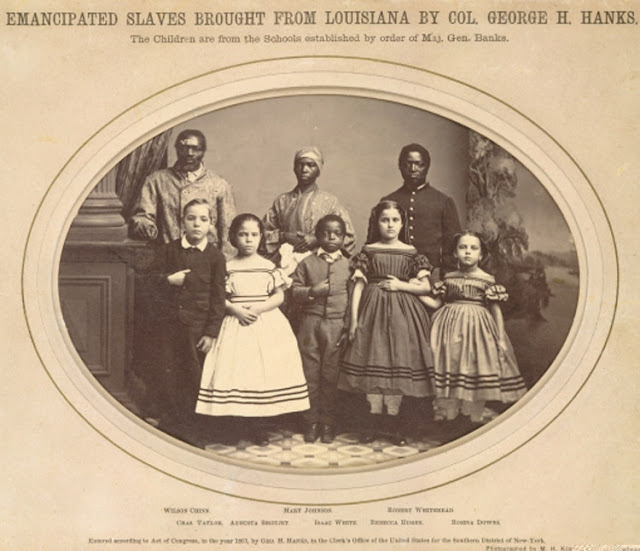
Source: Library Company of Philadelphia: Open Access Number P.9864
Having seen Wilson Chinn surrounded by the instruments of punishment for so many years, we rejoiced at discovering this photo of Wilson reading books with 3 of the young ex-slaves. Personal appearances and Cartes de Visites such as this were sold to obtain funds for the education of ex-slaves.
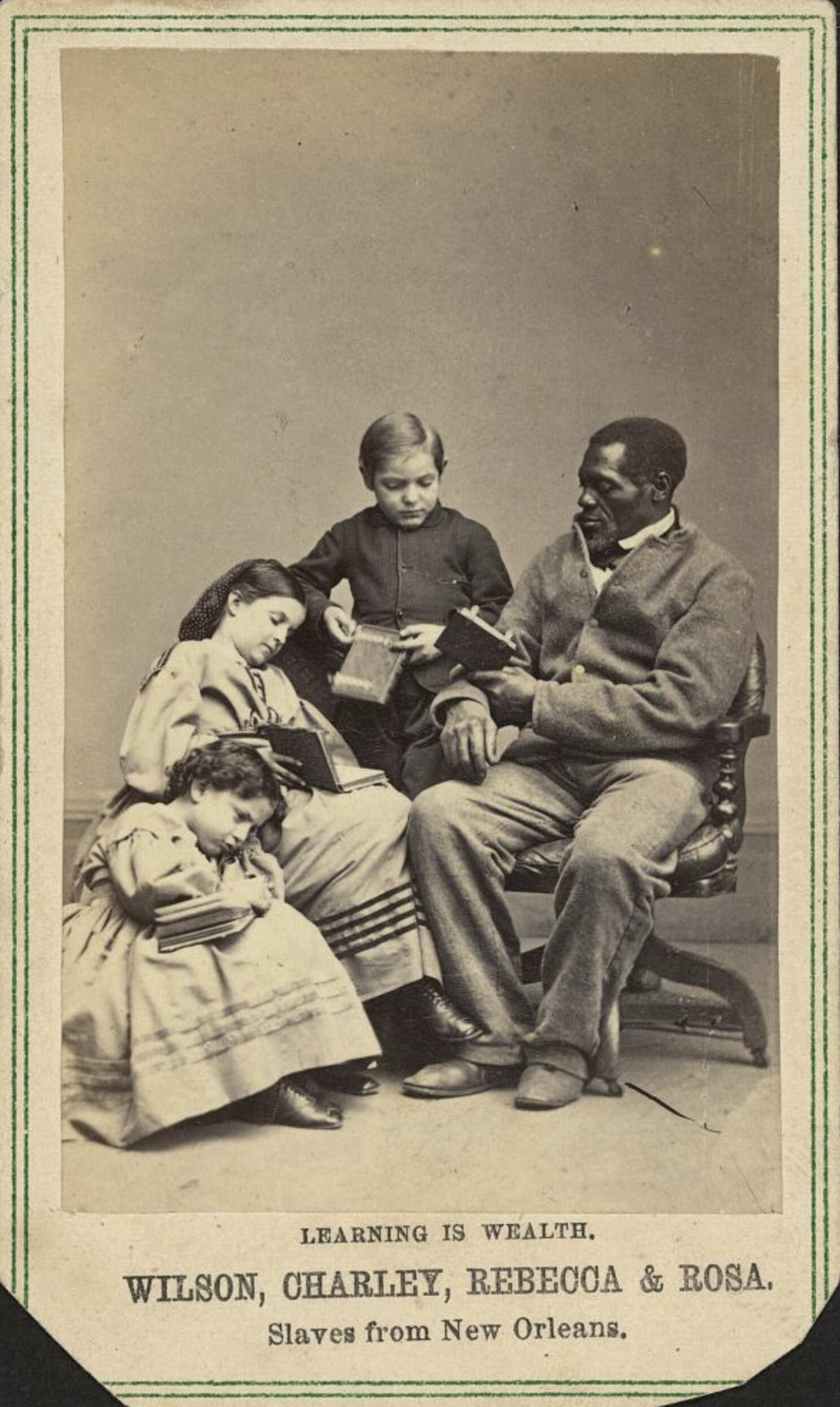
Source: Library of Congress. LCCN Permalink https://lccn.loc.gov/2010647859
Paxson, C., photographer. (ca. 1864) Learning is wealth. Wilson, Charley, Rebecca, and Rosa. Slaves from New Orleans / Chas. Paxson, photographer, New York. New Orleans Louisiana, ca. 1864. [Photograph] Retrieved from the Library of Congress, https://www.loc.gov/item/2010647859/.

Rebecca, Augusta and Rosa 1863
Thomas Jackson describes his impressions having met these 3 emancipated slaves from New Orleans.

The Underground Railway: African Americans escaping from slavery
One of Thomas Jackson’s sources described contrabands depending on other slaves to feed them and hide them as they fled to escape from slavery. In addition to this, there was a well established underground railroad that would help slaves flee north even into Canada. These abolitionists were of all backgrounds; white as well as black, men and women and many religions especially Quakers and methodists.

Margaret Garner- the desperation of a slave mother
A slave who killed two of her children so they would not have to endure slavery. She had escaped from Kentucky to Ohio and is seen now lying dead on the floor and found by the four men had been pursuing her. From painting by Thomas Satterwhite Noble.

Scars of a whipped Mississippi slave
Original photo taken April 2 1863 “Overseer Artayou Carrier whipped me, I was two months in bed sore from the whipping. My master come after I was whipped: He discharged the overseer. said by poor Peter as he sat for this picture.
Any thought that such viciousness was a very uncommon experience is challenged by reading the testimony written on the back of one of the cards displaying these cruel wounds.
Sources
1,2 and 3. Thomas Jackson Collection
4. Library of Congress http://loc.gov/pictures/item/985103870/
Reproduction of painting by Charles Webber. 1891
5. Library of Congress:://www.loc.gov/pictures/item/99614263 http
6 and 7 Library of Congress. https://www.loc.gov/item/2018648117/